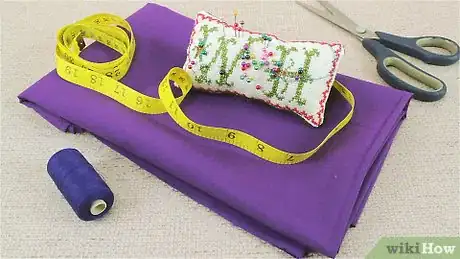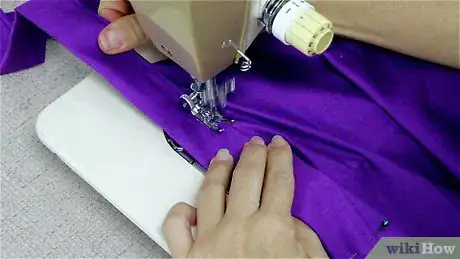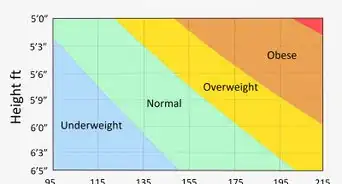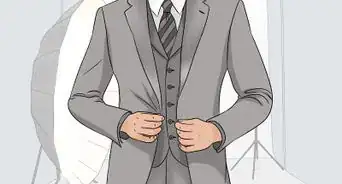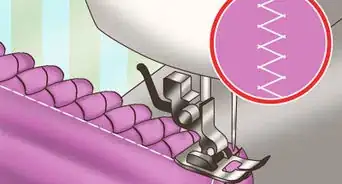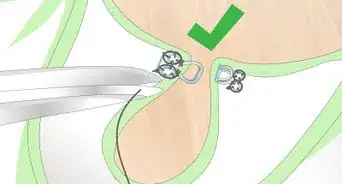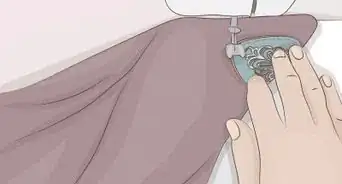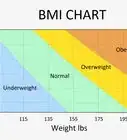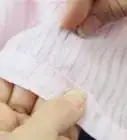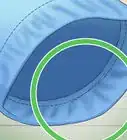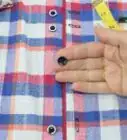This article was co-authored by Margo West. Margo West is a Professional Tailor and the Owner of Margo West Bridal Alterations in Dallas, Texas. She is renowned for her expertise in bridal alterations, custom wedding gowns, wedding-related design, and pattern making. Her 44 years of bridal experience has earned her the prestigious WeddingWire Brides Choice Award, Couples Choice Award 2013-2019, and The Knot Best of Weddings 2018-2020. Margo was also featured in House of Diffa 2018 Jacket Collection and Modern Luxury Brides Magazine 2020. She will launch her new bridal gown collection for fall 2021.
There are 14 references cited in this article, which can be found at the bottom of the page.
wikiHow marks an article as reader-approved once it receives enough positive feedback. This article received 11 testimonials and 89% of readers who voted found it helpful, earning it our reader-approved status.
This article has been viewed 603,274 times.
Wrap skirts are great since you can make one that will be easily adjustable to a wide range of sizes. A wrap skirt is also one of the easiest kinds of skirts to make since it doesn’t require special closures or elastic to keep it on. You can use any fabric you like to make your wrap skirt. You’ll just need some basic sewing skills and a sewing machine.
Steps
Measuring and Cutting the Fabric
-
1Choose a fabric that moves easily for a comfortable wrap skirt. You can use any type of fabric that you like for your wrap skirt, but cotton or jersey are great choices. Opt for cotton if you want your skirt to be slightly more structured or go with jersey for a skirt that has some stretch and movement.
- You can also opt for a sheer fabric, but you’ll need to wear leggings or a slip under it.
- A fabric that's a little stiff may be easiest to work with.[1] However, avoid fabrics that are very stiff, such as leather, vinyl, and denim, as these are harder to sew.
-
2Wrap the measuring tape around your waist and multiply the measurement by 1.5. Hold 1 end of the measuring tape and wrap the other end around your waist, about 2 in (5.1 cm) above your belly button.. Pull the measuring tape so that it’s snug around your waist and check the measurement. Then, multiply the measurement by 1.5.[2] This is an easy way to determine how wide you’ll need to cut the fabric for your skirt. Another option is to wrap the fabric around your waist 1.5 times and mark where this length ends.[3]
- For example, if your waist is 30 in (76 cm), then multiplying that number by 1.5 would give you 45 in (110 cm).
- It's also a good idea to take a measurement at the largest part of your hip. Write this number down, as well.[4]
Advertisement -
3Cut the fabric to the desired dimensions of your skirt plus 2 in (5.1 cm). Measure against your leg to decide how long you want the skirt to be and use this as your other measurement. Then, add 2 in (5.1 cm) to this measurement and to the waist multiplied by 1.5. The 2 in (5.1 cm) will provide extra fabric for the seam allowances.[5] Use a sharp pair of scissors to cut the fabric to these dimensions.[6]
- For example, if the waist times 1.5 is 45 in (110 cm), then adding 2 in (5.1 cm) gives you 47 in (120 cm). If you want the skirt to be 26 in (66 cm) long, then adding 2 in (5.1 cm) gives you 28 in (71 cm). This means that you’d need to cut the fabric to 47 in (120 cm) by 28 in (71 cm).
-
4Cut a 5 in (13 cm) wide rectangle 3 times your waist measurement for the waistband. This will ensure that you’ll have plenty of fabric for the waistband.[7] If you don’t have enough fabric to do this in one long strip, cut 2 strips that are half the total length you need and then sew them together.[8]
- For example, if your waist measurement was 38 in (97 cm), then you’ll need a 5 in (13 cm) wide strip that is 114 in (290 cm) long.
Folding the Fabric
-
1Fold the waistband piece in half lengthwise. Lay the waistband piece on a flat surface with the wrong (back) side of the fabric facing up. You’ll need a large, hard surface to work on, such as a table or clean area of a hardwood or linoleum floor. Then, fold the raw edges of the piece so that they’re lining up. Press hard along the fold to create a crease.[9]
- Another option is to iron along the fold to crease it. This may be necessary if the fabric doesn’t crease easily. Use the lowest setting on your iron to make a crease.[10]
-
2Open up the fabric and fold the edges to line up with the center crease. Once you’ve created a crease in the center of the strip, open it up again. Then, fold each of the long edges of the strip in so that they’re lining up with the crease.[11]
- Make sure that you fold the 2 pieces towards each other so they are meeting at the crease.
-
3Iron along the folded edges to crease them. Sewing the waistband will be easier if you press the edges flat with an iron. Use an iron on the lowest setting and run it along the folded edges of the waistband.[12]
Tip: If you’re using a delicate fabric, place a towel or T-shirt over the fabric first, and then iron it.
-
4Fold the strip in half again. After you have pressed the folded edge, fold the waistband strip in half lengthwise again. This will hide the raw edges on the inside of the strip. You may insert pins or iron the strip to keep it in this position until you’re ready to sew it.[13]
- Remember to remove the pins as you sew to avoid sewing over one of them. This will damage your sewing machine.
-
5Fold 0.25 in (0.64 cm) of the top edge and sides twice. Next, lay the skirt fabric with the wrong (back) side facing up. Then, fold over the top 0.25 in (0.64 cm) of fabric so that the raw edges are going in towards the wrong side of the fabric. Then, fold the edge over by 0.25 in (0.64 cm) again and insert pins in the fabric to keep it folded. This will completely hide the raw edges of the fabric and you’ll be read to sew it.[14]
- Repeat this for both sides of the skirt and the top edge, but don’t worry about the bottom edge yet.
Attaching the Waistband
-
1Sew a straight stitch to hem the side of the skirt piece. Once you have folded the edges of the skirt, take the fabric to the sewing machine and place it under the presser foot. Sew a straight stitch along each of these edges to secure the folded fabric.[15]
- Make sure to remove the pins as you sew. Don’t sew over the pins or you may damage your machine.
-
2Locate the center of the waistband and top edge of the skirt. Fold the waistband in half so that the ends are lined up. Then, insert a pin to indicate the center of the waistband. Fold the skirt piece in half as well and insert a pin near the top edge to indicate the center of the piece.[16]
-
3Insert pins to connect the waistband to the top edge of the skirt. Lay the waistband with the folded edge (where the 2 layers meet) facing away from you. Then, place the skirt piece over the waistband with the wrong (back) side of the fabric facing up. Arrange the 2 pieces so that the edges and the center lines are lining up.[17]
Tip: Insert the pins so that they are perpendicular to the edge of the fabric. This will make it easier to remove them when you’re ready to sew.
-
4Sew a straight stitch to attach the waistband to the skirt. Once the waistband and the skirt are pinned together, take the 2 pieces to your sewing machine. Sew a straight stitch starting at 1 end of the waistband, going all the way down along the edge of the skirt, and to the opposite end of the waistband. Keep the stitch about 0.25 in (0.64 cm) from the edge of the waistband and skirt.[18]
- Remember to remove the pins as you sew!
Hemming the Skirt and Waistband Ends
-
1Adjust the skirt length if needed. After you have finished sewing the skirt together, put it on to see if the length is where you want it to be. If you’d like it a little shorter, then mark where you want it to fall on the fabric. Then, lay the fabric out flat and cut the fabric 0.5 in (1.3 cm) below this point to make room for the seam allowance.[19]
- Make sure to use a sharp pair of scissors to cut across the fabric. Go slowly and cut straight to avoid leaving any jagged edges.
-
2Hem the skirt by folding over the edge twice and sewing a straight stitch. Next, fold 0.25 in (0.64 cm) of the fabric along the bottom edge of the skirt going in towards the wrong side. Then, fold it over by 0.25 in (0.64 cm) again. Secure the folded edge of the skirt with pins and then sew a straight stitch along the folded edge.[20]
- Remove the pins as you sew to avoid damaging your sewing machine.
-
3Trim the ends of the waistband and hem them. After you finish sewing the bottom edge of the skirt, check the length of the waistband ties. If you want to shorten them, cut off the desired amount. Then, push 0.5 in (1.3 cm) of the raw edges at the ends of the waistband inwards so that they are hidden. Sew a straight stitch about 0.25 in (0.64 cm) from the ends of the waistband to secure the fabric.[21]
- After you have finished the ends of the waistband, your skirt is complete! Wrap it around your waist and tie it in a bow or knot to secure it.
Expert Q&A
Did you know you can get expert answers for this article?
Unlock expert answers by supporting wikiHow
-
QuestionWhat measurements do I need for a wrap skirt?
 Margo WestMargo West is a Professional Tailor and the Owner of Margo West Bridal Alterations in Dallas, Texas. She is renowned for her expertise in bridal alterations, custom wedding gowns, wedding-related design, and pattern making. Her 44 years of bridal experience has earned her the prestigious WeddingWire Brides Choice Award, Couples Choice Award 2013-2019, and The Knot Best of Weddings 2018-2020. Margo was also featured in House of Diffa 2018 Jacket Collection and Modern Luxury Brides Magazine 2020. She will launch her new bridal gown collection for fall 2021.
Margo WestMargo West is a Professional Tailor and the Owner of Margo West Bridal Alterations in Dallas, Texas. She is renowned for her expertise in bridal alterations, custom wedding gowns, wedding-related design, and pattern making. Her 44 years of bridal experience has earned her the prestigious WeddingWire Brides Choice Award, Couples Choice Award 2013-2019, and The Knot Best of Weddings 2018-2020. Margo was also featured in House of Diffa 2018 Jacket Collection and Modern Luxury Brides Magazine 2020. She will launch her new bridal gown collection for fall 2021.
Professional Tailor Use your tape measure to measure around your waist, about 2" above your belly button. Take that measurement and multiply it by 1.5, and write that number down. Then, measure around the largest part of your hips, as well as from your waist down to where you want the skirt to end. Write those numbers down, as well.
Use your tape measure to measure around your waist, about 2" above your belly button. Take that measurement and multiply it by 1.5, and write that number down. Then, measure around the largest part of your hips, as well as from your waist down to where you want the skirt to end. Write those numbers down, as well. -
QuestionHow would I make it reversible?
 Community AnswerCut 3 trapezoids of one fabric, cut 3 trapezoids of second fabric. Sew each set of three together as instructed above. Then lay one set on top of the other set, right sides together. Stitch down front, across all three panels at the hem, then up the inside front. Turn right side out, press, top stitch all around. Finish the waistband as desired.
Community AnswerCut 3 trapezoids of one fabric, cut 3 trapezoids of second fabric. Sew each set of three together as instructed above. Then lay one set on top of the other set, right sides together. Stitch down front, across all three panels at the hem, then up the inside front. Turn right side out, press, top stitch all around. Finish the waistband as desired. -
QuestionCan this skirt be made for plus-sized women?
 Community AnswerYes, just use the correct waist measurements to make a skirt for plus-sized women.
Community AnswerYes, just use the correct waist measurements to make a skirt for plus-sized women.
Warnings
- Avoid using slippery fabrics to create a wrap skirt. These can be harder to secure with a tie and they may come undone without warning.⧼thumbs_response⧽
Things You’ll Need
- Measuring tape
- Fabric
- Scissors
- Pins
- Sewing machine
- Thread
References
- ↑ Margo West. Professional Tailor. Expert Interview. 7 December 2020.
- ↑ Margo West. Professional Tailor. Expert Interview. 7 December 2020.
- ↑ https://www.youtube.com/watch?v=ylm1BWnFBeo&feature=youtu.be&t=15
- ↑ Margo West. Professional Tailor. Expert Interview. 7 December 2020.
- ↑ https://weallsew.com/sew-wrap-skirt/
- ↑ https://www.youtube.com/watch?v=6VDubLFidPU&feature=youtu.be&t=155
- ↑ Margo West. Professional Tailor. Expert Interview. 7 December 2020.
- ↑ https://www.youtube.com/watch?v=6VDubLFidPU&feature=youtu.be&t=155
- ↑ https://www.youtube.com/watch?v=6VDubLFidPU&feature=youtu.be&t=315
- ↑ https://weallsew.com/sew-wrap-skirt/
- ↑ https://www.youtube.com/watch?v=6VDubLFidPU&feature=youtu.be&t=330
- ↑ https://www.youtube.com/watch?v=6VDubLFidPU&feature=youtu.be&t=340
- ↑ https://www.youtube.com/watch?v=6VDubLFidPU&feature=youtu.be&t=360
- ↑ https://www.youtube.com/watch?v=6VDubLFidPU&feature=youtu.be&t=390
- ↑ https://www.youtube.com/watch?v=6VDubLFidPU&feature=youtu.be&t=390
- ↑ https://www.youtube.com/watch?v=6VDubLFidPU&feature=youtu.be&t=450
- ↑ https://www.youtube.com/watch?v=6VDubLFidPU&feature=youtu.be&t=450
- ↑ https://www.youtube.com/watch?v=6VDubLFidPU&feature=youtu.be&t=532
- ↑ https://www.youtube.com/watch?v=6VDubLFidPU&feature=youtu.be&t=721
- ↑ https://www.youtube.com/watch?v=6VDubLFidPU&feature=youtu.be&t=760
- ↑ https://www.youtube.com/watch?v=6VDubLFidPU&feature=youtu.be&t=800
